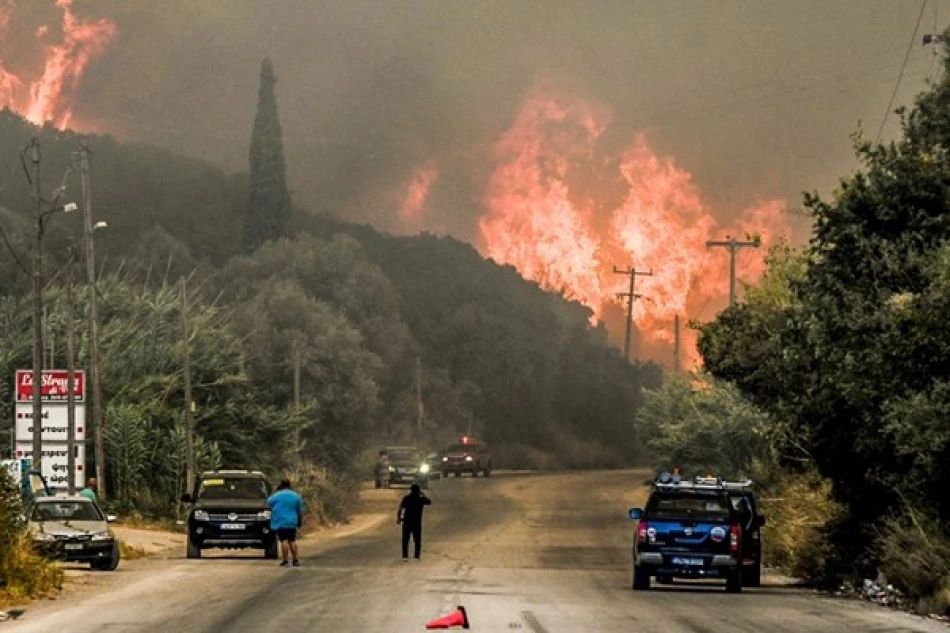
Wildfires Force Greek Authorities to Evacuate Coastal Areas, Disrupt Summer Plans
Mediterranean Wildfire Crisis Intensifies as Greece Faces "Worst Days" of Fire Season
Greece is battling its most severe wildfire crisis of the year, with coast guard vessels evacuating tourists and locals from multiple islands while Spain reports its first firefighting casualty. The dual-nation emergency underscores how climate-driven extreme weather is transforming Mediterranean summers into annual disaster zones, threatening both lives and the region's crucial tourism economy.
Greece Struggles with Mass Evacuations Amid Extreme Weather
Greek authorities conducted dramatic beach evacuations on the island of Chios as forest fires in Velosis forced thousands to flee coastal areas. The situation deteriorated rapidly in the northwestern Peloponnese, where entire communities in Kato Agia and Agios Konstantinos—located approximately 48 kilometers west of Athens—were forced to abandon their homes.
A senior Greek fire official acknowledged Wednesday that the country remains in the grip of its most challenging fire season days, with dozens of new blazes erupting within a single 24-hour period. The admission signals that Greece's fire management infrastructure is being pushed beyond its limits.
Weather Conditions Create Perfect Storm
The crisis stems from a devastating combination of powerful winds, prolonged drought, and extreme temperatures that have turned Greece's mainland and islands into tinderboxes. These conditions have made fire containment nearly impossible, forcing authorities to prioritize human evacuation over property protection.
Spain Reports First Firefighting Death as Blazes Spread
Spain's fire emergency claimed its first life when a volunteer firefighter died Tuesday evening while battling flames in León province. The tragedy occurred as five separate forest fires burned across the country, with the most severe blaze in the northwestern Ourense region consuming 3,500 hectares of land.
The volunteer's death highlights the increasing risks faced by firefighting crews as Mediterranean wildfires grow more intense and unpredictable. Spain's firefighting community, which relies heavily on volunteer support, now confronts the reality that traditional suppression methods may be inadequate for the new climate reality.
Tourism Industry Faces Climate Reckoning
The simultaneous crises in Greece and Spain expose a critical vulnerability in the Mediterranean tourism model. Both countries depend heavily on summer visitors, yet the same peak season now coincides with extreme fire danger. The dramatic beach evacuations in Greece particularly underscore how quickly tourist destinations can transform into emergency zones.
This pattern mirrors similar challenges faced by other fire-prone tourist destinations, from California's wine country to Australia's coastal regions, where the tourism industry has been forced to adapt to recurring wildfire threats.
Regional Pattern Suggests New Normal
The Mediterranean basin has experienced increasingly severe fire seasons in recent years, with countries like Turkey, Italy, and Portugal also facing major blazes. The current Greece-Spain emergency suggests that simultaneous multi-country fire crises may become routine rather than exceptional.
Unlike previous decades when major fires were typically isolated events, the region now faces coordinated extreme weather patterns that can overwhelm national response capabilities. This shift demands new approaches to international fire management cooperation and resource sharing across European borders.
The economic implications extend beyond immediate damage costs. As Mediterranean summers become synonymous with evacuation risks, the region's tourism competitiveness may face long-term pressure, potentially accelerating shifts toward shoulder-season travel and climate-resilient destination development.
Most Viewed News

 Layla Al Mansoori
Layla Al Mansoori






